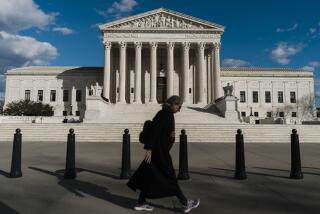Government’s Ugly Secret
- Share via
George W. Bush probably never heard of RCA engineer and family man Al Palya or the eight other men who died in October 1948 when the military plane they were aboard crashed into a Georgia field. But without a negligence lawsuit brought by Palya’s widow and two others against the Air Force, Bush’s authority as president might be much different. The lawsuit went up to the Supreme Court, which ruled that government had a right to keep secrets even from federal judges on grounds of national security. The 1953 ruling, in U.S. vs. Reynolds, is a basis for the unilateral authority that Bush has claimed since September 2001 to spy on, detain and prosecute terror suspects without releasing any information about these actions.
As The Times’ Barry Siegel reported Sunday and Monday, the Air Force was protecting lies about the airplane’s safety, not state secrets. Those lies have given rise to half a century of legal precedents and case law. The shady origins of this secrecy right should give pause to Congress before it considers further expanding law enforcement agencies’ powers or endorsing the president’s continued detention of terror suspects without lawyers or charges.
The day he died, Al Palya was testing a pilotless guidance system he helped engineer. That system did not cause the lumbering B-29 to crash. The plane exploded 40 minutes into flight after its engines caught fire, a result of poor maintenance and negligence.
Palya’s daughter, Judy, was 7 weeks old when he died. She wouldn’t learn the truth until 2000 because the Air Force kept insisting that releasing its report might harm national security. In ruling in the damage suit the families filed, neither the trial judge nor the appeals court judge bought the military’s argument. But with the Cold War brewing and the Korean War hot, the Supreme Court did buy it, upholding the government’s secrecy privilege.
Only decades later, when the military declassified old reports, did Al Palya’s daughter learn that the accident report contained no state secrets. None. It did expose the Air Force’s failure to make needed repairs to its B-29 fleet.
The “state secrets privilege” doctrine that the Reynolds case spawned has swelled into constitutional principle. The government has invoked it to protect information about alleged collusion between defense contractors; alleged civil rights violations by the FBI; and the purchase, insurance and inspection records of a government mail truck involved in an accident. More recently, the case has undergirded much of the Bush administration’s response to the Sept. 11 attacks.
Enough. Bush wants Congress to expand the already-sweeping Patriot Act powers, and his lawyers were before the Supreme Court on Tuesday defending the president’s authority to jail terror suspects outside the reach of judges or juries. Trust us, they insist, that we won’t abuse this power. But Judy Palya Loether’s long search to learn how her father died is even now an object lesson to lawmakers and high court justices on the perils of giving government officials the sole power to decide what citizens should know.
More to Read
Sign up for Essential California
The most important California stories and recommendations in your inbox every morning.
You may occasionally receive promotional content from the Los Angeles Times.










